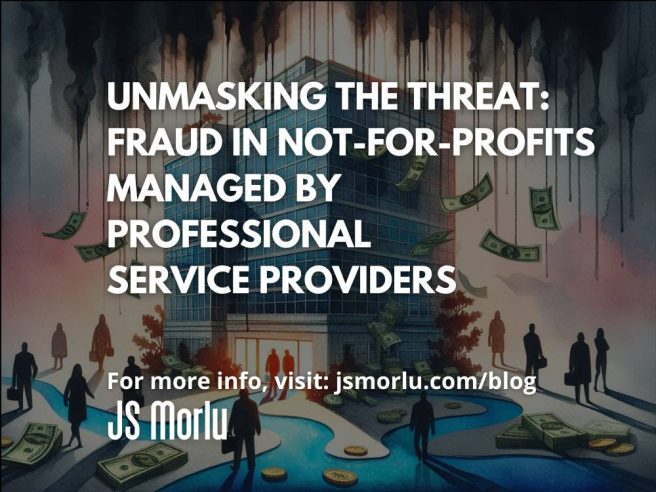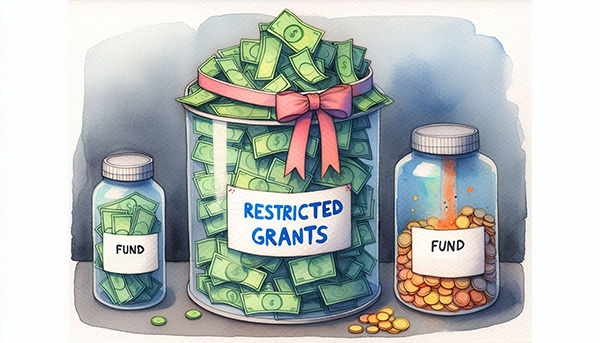By: John S. Morlu II, CPA
Introduction
Not-for-profit organizations (NFPs) are mission-driven entities that play a vital role in strengthening communities, advocating for causes, and delivering critical services. To improve efficiency and focus on their core mission, many NFPs outsource financial management, donor administration, grant compliance, and operational oversight to professional service providers. At their best, these relationships enhance professionalism, financial transparency, and compliance. But what happens when those trusted to support the mission become the very source of mismanagement—or worse, fraud?
While outsourcing brings specialized expertise, it also creates blind spots. Without strong internal controls and active oversight, NFPs can fall victim to financial abuse that compromises not only their funds but also their reputation and donor trust. The fallout can cripple programming, erode stakeholder confidence, and trigger legal or regulatory action.
In this essential read, we unpack the most common fraud risks nonprofits face when working with third-party management firms or outsourced finance teams. Using real-world examples, industry insights, and prevention strategies, we equip nonprofit leaders, board members, and stakeholders with the knowledge to identify red flags, protect their resources, and ensure accountability.
Why Are Nonprofits Vulnerable to Fraud?
NFPs often operate with limited internal staffing and lean budgets, relying on outside help to manage their finances, grant reporting, and donor relations. Unfortunately, this reliance can open the door to fraud when oversight is lax or when controls are poorly enforced.
Common Risk Factors:
1. Concentrated Financial Authority
2. Weak Internal Controls
3. Donor Blind Spots
4. Passive Boards
Industry Insight:
According to the Association of Certified Fraud Examiners (ACFE), small organizations (including many NFPs) lose an average of 5% of revenue annually to fraud.
Top Fraud Risks for Not-for-Profits Working with Professional Firms
1. Diversion or Embezzlement of Donor Funds
Fraud often starts with subtle misuse—unauthorized reimbursements, inflated expenses, or diverted donations. Over time, it can escalate into full-scale embezzlement.
Case Study:
A nonprofit in Illinois discovered that its outsourced bookkeeper had siphoned off nearly $400,000 over seven years.
Red Flags:
- Donor complaints
- Delayed reports
- Unexplained spending
Solutions:
- Dual signatories
- External CPA audits
2. Fake Vendors and Phantom Projects
Fraudsters may create ghost vendors, charge for services never rendered, or bill excessive fees.
Case Study:
A youth-focused charity uncovered fraud totaling $280,000.
Red Flags:
- Unknown payees
- Unverified services
- No competitive bidding
Solutions:
- Vendor vetting
- Pre-approved vendor lists
3. Misuse of Restricted Grants and Donations
Restricted funds are often co-mingled or misallocated.
Case Study:
A nonprofit hospital system diverted $1.2 million in grant money.
Red Flags:
- No separate accounts
- No tracking system
Solutions:
- Grant-specific accounting
- Board fund reviews
4. Manipulation of Financial Statements and Donor Reports
To conceal losses or maintain appearances, financials may be altered.
Case Study:
A Washington-based arts nonprofit masked a $250,000 deficit.
Red Flags:
- Late or complex reports
- Delayed filings
Solutions:
- Finance committee oversight
- Reconciliations during audits
5. Fraudulent Handling of Membership Dues and Event Revenues
Cash-intensive events are ripe for skimming.
Case Study:
A nonprofit lost nearly $100,000 from event donations.
Red Flags:
- Missing documentation
- Discrepant dues reports
Solutions:
- Secure online systems
- Event reconciliations
How to Safeguard Your Nonprofit from Fraud
1. Strengthen Board Governance
- Understand reports
- Rotate leadership
2. Independent Audits
- Annual or surprise audits
3. Clear Operational Policies
- Written procedures
- Contractual clarity
4. Educate Staff and Volunteers
- Training
- Ethical culture
5. Engage Donors and Stakeholders
- Share reports
- Whistleblower channels
Conclusion
Nonprofits exist to do good. But good intentions can’t shield against bad actors. Fraud in nonprofits managed by outside firms is more common than many assume—and the consequences can be devastating. Fortunately, by recognizing the risks, staying vigilant, and fostering a culture of transparency and accountability, nonprofit leaders can protect their mission, their money, and the trust of their communities.
Final Tidbit
In some U.S. states, nonprofits are legally required to segregate donor-restricted funds in separate accounts—yet studies show nearly 60% fail to comply. A simple policy update could save your organization from disaster.
Author: John S. Morlu II, CPA is the CEO & Chief Strategist of JS Morlu, a globally acclaimed public accounting and management consulting powerhouse.
Through cutting-edge technology and data-driven strategy, JS Morlu helps organizations operate with clarity, control, and compliance.
– ReckSoft (www.recksoft.com ): AI-powered reconciliation for nonprofit and donor accounting
– FinovatePro (www.finovatepro.com ): Cloud accounting for donor-driven missions
– Fixaars (www.fixaars.com ): Empowering nonprofits with maintenance and repair logistics
JS Morlu LLC is a top-tier accounting firm based in Woodbridge, Virginia, with a team of highly experienced and qualified CPAs and business advisors. We are dedicated to providing comprehensive accounting, tax, and business advisory services to clients throughout the Washington, D.C. Metro Area and the surrounding regions. With over a decade of experience, we have cultivated a deep understanding of our clients’ needs and aspirations. We recognize that our clients seek more than just value-added accounting services; they seek a trusted partner who can guide them towards achieving their business goals and personal financial well-being.
Talk to us || What our clients says about us





